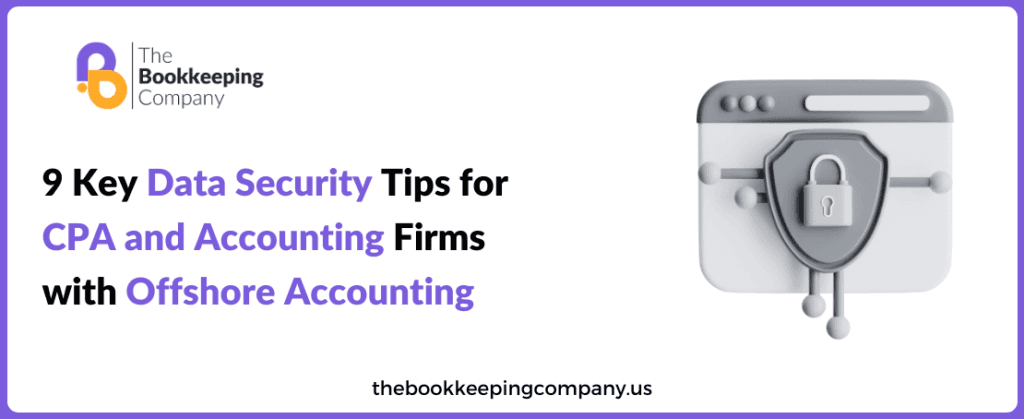9 Key Offshore Data Security Tips for Accounting and CPA Firms

In today’s globalized business environment, many CPA firms leverage offshore staffing to enhance productivity and access specialized skills. However, with this advantage comes the responsibility of ensuring robust data security. Offshore staffing requires specific practices to protect sensitive client information and maintain compliance with industry regulations. Here are essential data security practices, including stringent policies, that CPA firms should adopt to uphold data security when working with offshore staff.
Offshore Data Security
1. Use Secure File-Sharing Platforms
One of the primary challenges in offshore staffing is transferring sensitive information securely. CPA firms should rely on encrypted file-sharing platforms to ensure that data remains protected during transfers. Personal or unsecured channels should be avoided, as they can pose security risks. Additionally, client data should be restricted from being downloaded onto office servers, preventing unauthorized access or local storage of sensitive information.
2. Enforce Device and Data Transfer Restrictions
To prevent any physical data breaches, restrict the use of data transfer devices such as pen drives, hard disks, CDs, and DVDs in the operations area. Additionally, devices that pose security risks—such as cell phones, cameras, and tablets—should be strictly prohibited. These measures minimize the risk of data theft or unauthorized data capture.
3. 24/7 Surveillance and Monitoring
Continuous monitoring of data-handling areas is essential. By implementing 24/7 CCTV surveillance, CPA firms ensure constant monitoring of all areas where sensitive data is managed. This approach not only enhances security but also ensures compliance with monitoring protocols for data protection.
4. Restrict Access to Non-Essential Platforms
Restricting access to non-essential platforms, including social media, e-commerce websites, and other non-work-related platforms, minimizes potential cybersecurity risks and ensures that offshore staff stay focused on secure, work-related tasks.
5. Prohibit Personal Email Use
Personal email use should be restricted during working hours to prevent unauthorized data sharing and reduce the risk of data leakage. This policy helps ensure that all data communication is conducted securely within approved channels.
6. Utilize Strong Firewalls and SSL Encryption
A strong firewall with 256-bit SSL encryption ensures that all client data and communications are protected at the highest industry standards. SSL encryption is vital for securing data exchanges and communications, safeguarding client information from potential cyber threats.
7. Conduct Regular Security Audits and Testing
Regular security audits and penetration testing allow CPA firms to identify and address potential vulnerabilities in their systems. Routine audits ensure that data security practices are up-to-date and effective, providing reassurance that client data is consistently protected.
8. Limit Data Access Through Role-Based Permissions
Role-based access control restricts data access to only those who need it, ensuring sensitive information remains confidential. By implementing a need-to-know basis approach, firms limit data exposure and prevent unauthorized viewing or handling of client information.
9. Conduct Comprehensive Employee Background Checks
Thorough background checks on employees handling client data reinforce a secure environment and ensure that only trusted, qualified individuals manage sensitive information. This practice is crucial in offshore staffing, where maintaining data integrity is paramount.
Conclusion
Data security is paramount in offshore staffing, especially for CPA firms that handle sensitive client information. By adopting these essential practices—including secure file-sharing, MFA, device restrictions, and 24/7 surveillance—your firm can protect client data, maintain compliance, and build trust. These strategies not only safeguard information but also demonstrate a firm commitment to data security in offshore staffing.
Offshore Data Security
We safeguard your data with advanced encryption and round-the-clock monitoring, keeping your information secure and confidential at all times.
